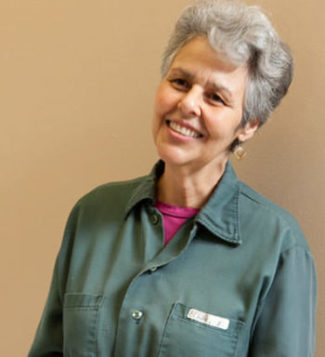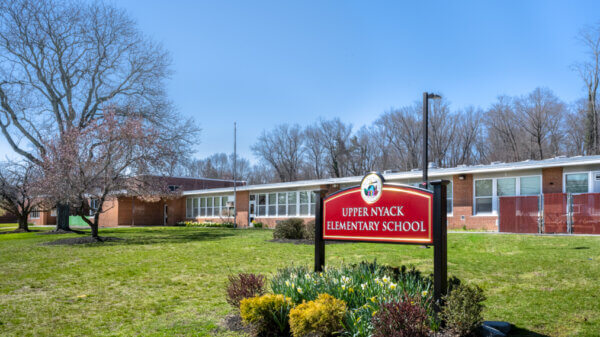
Judith Clark
Judy Clark’s story is a familiar one to most Rockland residents. In 1981, Clark drove the getaway car in the Weather Underground’s robbery of a Brinks armored car in Nyack when guard Peter Paige and two Nyack police officers, Waverly Brown and Ed O’Grady, where fatally shot. Part I of this series included an interview with journalist Tom Robbins. In Part II, Jennifer Mancuso talked to Rule of Law Initiative Coordinator Colleen Kelly about losing loved ones to tragedy. In Part III, the last interview in the series, Jennifer Mancuso talks to retired Chairman of the New York State Parole Board, Robert Dennison, about the parole process, and the politics that could influence whether she is released.
by Jennifer Mancuso
Robert Dennison is a retired Chairman of the New York State Parole Board. Before being appointed as a commissioner on the parole board, Dennison worked as a parole officer and he later worked as a corrections officer. Very often parole board commissioners are people with law enforcement backgrounds.
Judy Clark’s commutation by Governor Cuomo means that she is now eligible to go before a parole board. Her previous sentence of 75-to-life would have meant that she would have to serve 75 years before there was the possibility of parole. With her sentence commuted to 35-to-life, she is eligible for parole after serving 35 years, which she has now served.
I was interested in talking to Robert Dennison because I wanted to understand more about the parole process that Clark and others will experience as the gateway to their release. My prison justice advocacy group is currently exploring ways to support parole reform. Currently, inmates can wait 20 or more years to have a parole hearing and then are given approximately 15 minutes to talk to the parole board via video conference. After 20 or 30 years in prison their redemption is determined within a few minutes by people who are not ever in their physical presence.
Robert Dennison helped me to understand the nature of parole appointments and what influences the decisions of parole board commissioners. He is also critical of the length of time commissioners get to spend with inmates at a parole hearing and the fact that they don’t get to sit in a room with the parole candidates.
There are 19 seats on the New York State Board of Parole. It is the job of the governor to appoint commissioners to the parole board. At any given parole hearing, two to three of those 19 commissioners will be assigned to decide on a case.
Jennifer Mancuso: How did you come to know Judy Clark?
Robert Dennison: I first met Judy Clark in 2005 when I went to Bedford Hills Correctional Facility as Chairman of the Parole Board to speak to a group of women who were serving lengthy sentences. I think they called them the long termers group. Judy was one of the people in the group. I was very impressed. She is a very articulate and thoughtful person.
She said that the recidivism rate for women serving lengthy sentences was extremely low. They wanted to know the statistics. So I looked into those statistics and it turned out that the percentage of women who served lengthy sentences and were released and then came back to prison with a new State sentence was very low. Extremely low.
Then I retired and I was talking to Sara Bennett, Judy’s then-lawyer, about trying to get clemency for Judy from then-Governor [David] Patterson.
I went to Rockland County. I went to the memorial service at the Thruway entrance for the police officers who were killed.
And I also met all of the families who suffered the loss of their fathers and brothers and cousins. Kathy Boudin came up for parole. And as part of the duties of a Parole Board Commissioner, if families want to tell you how they feel about the loss of their loved ones, you are required to meet with them. A court reporter comes and they have a transcript of that meeting. They call it a Victim’s Impact Statement. And the transcript of that meeting is sent to the commissioners who hear that case. So I met with the family members. There were 10 or 11 family members. It was very sad.
I also met with Governor Patterson and tried to convince him of why he should give Judy clemency. He was in the perfect position to give her clemency, in my opinion, because he didn’t aspire to any higher political office. He later said that he didn’t have enough courage to do it but that he knew it was the right thing to do.
So then I didn’t see Judy. I didn’t think Governor Cuomo would grant her clemency because he aspires to a higher political office and would worry that this decision could hurt him politically. He might not have done it if he hadn’t gone to meet her. But once you meet her and she tells you her story, you believe that her remorse is genuine. I admire Governor Cuomo for commuting her sentence. I believe he did it for the right reasons.
What will Judy’s parole hearing look like?
There are six vacancies on the parole board. They are supposedly going to fill them in the spring. The big question is who is going to be sent to see her? There are some people who would not let her out regardless of all her achievements and how she’s changed. Even though Governor Cuomo has basically told them to let her out, I suspect some of them don’t really care. It really depends on who sees her on the parole board.
And they will look at what she knew that day. She knew there would be a robbery. But she didn’t even know where it was until the day of the incident. She didn’t know anyone would be killed, obviously. But she knew there would be guns. She was asked to borrow a car and drive to a particular location and wait there. She knew a crime was going to be committed. Two police officers are dead. One security guard is dead. She is responsible–certainly legally–for their deaths, and she has acknowledged this and accepted responsibility.
A lot of it sounds political. If they are concerned about being reappointed by Governor Cuomo, will that influence their decision?
It’s a tricky thing. If I want to get reappointed and I knew this parole candidate was given a commutation by my governor, who probably reappointed me in the first place, looking at it logically you would say I should do what the governor wants. On the other hand, you could say, I know the governor would want me to make an independent decision on this case and doesn’t want me to just rubber stamp his decision. I don’t know which scenario is going through their minds. Even though the governor appoints them to the parole board, it’s their local senators who push for them to governor.

Robert Dennison
Can you explain how that works?
People get on the parole board in several ways. The main way is that your local Senator talks to the Governor’s Appointments Officer and tries to push your name to get on the parole board. If the governor likes the local senator or the governor wants something in the future from the local Senator or if he owes him for something they did, then you’re more apt to get on the parole board. And that’s the dilemma that the parole commissioners face. The commissioners have to consider not only what the governor thinks but how their local senators feel about Judy’s release.
So is it ever really about whether or not a person is actually worthy of parole or is it all politics?
Ideally it should be [about merit]. Many, many people deserve to get out, but even if the parole commissioners know they will do well out there, if the nature of their crime is very bad, they might not let them out.
In Judy’s case, most of the shooters are out. Kathy Boudin was much more culpable. She was in the truck with the shooters. She gave the police the impression that there was nothing in the truck and they knew when the police officers opened those doors they were going to get shot. In my opinion Kathy Boudin was much more culpable than Judy Clark, but she got a 20-to-life sentence.
And the two commissioners who let Kathy Boudin out did not get reappointed by Governor Pataki. When I went in to go over the names of the people who were up for reappointment, I started to talk about these two commissioners and the appointments officer said “Don’t say anything. It doesn’t matter what you say, they are not getting reappointed.”
Can you tell me more about the parole hearings?
There are two schools of thought when people come up for parole who have been convicted of murder. Some commissioners only care about the nature of the crime. Other commissioners will look at the person’s age, their accomplishments, how they have changed.
The parole interviews are very quick and the commissioners often make their decision before they even see the person. The commissioners have the person’s whole file ahead of time. And they write up a report before they meet the person. When they meet the person, they could change their minds and rip it up. But when you write something up, you tend to follow through more often than not.
The most important factor for many is what the crime was. The next factor is how long have they been in prison.
At the parole hearing, which is usually about 10 minutes and is done by video chat, the parole officers will ask the person how they could commit such a crime. They will ask: “What led up to the crime? How have you changed? Do you take responsibility?”
They also take into account the Victim’s Impact Statement.
Then they ask them, superficially, what they will do when they get out of prison. Where will they live? Although, I think that has less weight on their decision.
When you were on the parole board and you would review cases, what was the most important consideration for you?
You automatically go to the nature of the crime first. But it should not be the only thing you consider. When you take a life, there’s all different kinds of taking a life. You can stab someone, you can shoot someone, you can strangle someone, or you can be a look-out in a car who is technically guilty of murder. So that’s a big factor: What the person actually did and why they did it.
I understood from the New York Times article that you have some criticisms of the parole board. Can you tell me what you think could most be improved?
The Times article made it sound like I agree that race is an issue. I don’t know that race is an issue. One of the things that I think could be improved is that the parole board should spend more time with the person. If a person has waited 25 years to see a parole board, they should get more than 10 or 15 minutes. The other criticism I expressed in the Times article is that through a television is a terrible way to make a decision on a case. And most of these cases are done by video. I think face to face is a better way to form an opinion.
My biggest criticism of the current parole board is that if someone has done what the judge has asked them to do, and has done well in prison, they don’t have to be educated or articulate. There was a young woman I was working with at Bedford Hills named Elizabeth Gonzalez. She was involved with an older man. She was 17 and he was 37. They were both drug addicts. She was robbing pocket books in Manhattan and he was the lookout. She robbed a lady on Madison Ave. and the lady fell down and hit her head and died. Elizabeth Gonzalez didn’t know the person died. She grabbed the pocketbook and ran. Then the next week, she came back to Madison Ave. This time, the cops were waiting and they caught her. And being naïve, when they asked her about the other robbery she thought “They got me for this one, they’ll get me for that one too” and she admitted to it. And then they charged her with murder. She got 18-to-life. Which is a long time for something like that, even though it is murder. So I spoke to the sentencing judge and told him she had done well in prison, and he wrote a letter on her behalf to the parole board. The sentencing judge wrote a letter on her behalf and the parole board held her anyway. Denied her parole.
There’s two phrases the parole commissioners use to deny parole. One is, “To release you at this time would deprecate the seriousness of your criminal act and undermine respect for the law.” If the person has a prior record they could also say, “We feel there is a reasonable probability that you would continue to violate the law.”
Do the members of the parole board come primarily from law enforcement? Are there any social workers?
There is a mix, but it has been the case that most appointments have been in law enforcement, because it is an easier push for senators to sell. But I don’t think Governor Cuomo cares. I think when he appoints some of the six new commissioners, some of them may be from other fields, like social work. There is a mix. There are lawyers on the parole board. District Attorneys.
It makes sense for it to be mixed. Like you were a parole officer. You had experience working with people who were paroled. You have a sense of who succeeded who didn’t.
My appointment was not based on my experience. I had a friend who had a construction company and he did fundraisers. He raised funds for anyone, Democrats, Republicans, because he thought it was good for his business. And he raised money for the Conservative party and then he pushed my name to them for the parole board.
As far as Judy’s parole hearing, I don’t know what the parole commissioners will base their decisions on. It would be a shame if they deny Judy parole. She is not a threat to society. She is truly sorry for what she did. She is not the same revolutionary she was in 1981. She has so much insight into why she did what she did. There are many good reasons to let her out…. And then, on the other hand, three people are dead.
I don’t know what kind of questions she is going to have to answer. There was a gun found under the seat of her car, which I am sure was put there by one of the guys she picked up. Judy doesn’t know anything about guns. She doesn’t know how to use a gun.
The police are saying she was reaching for the gun when they pulled her over.
I think they would have shot her. Especially when they already knew police officers were shot. I don’t know. I would think they would have shot her.
People don’t know the facts. It’s easier in a lot of situations not to learn the facts. Because to know the facts, you have to dig, you have to do a lot of work. It’s easy to say she was involved with these guys, so who cares about the facts?








